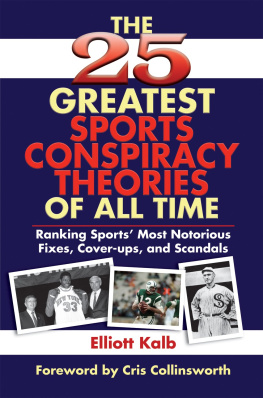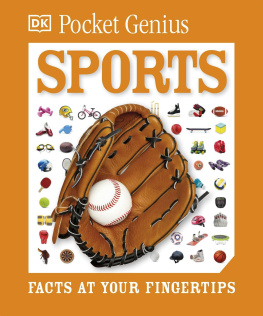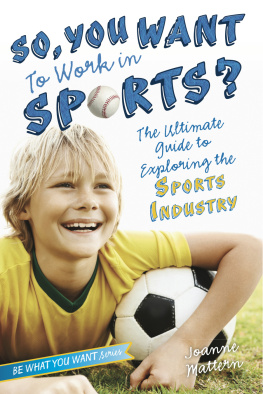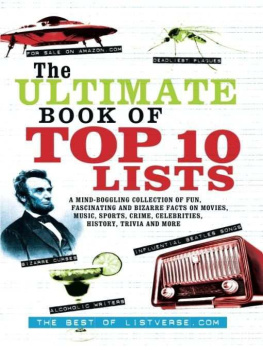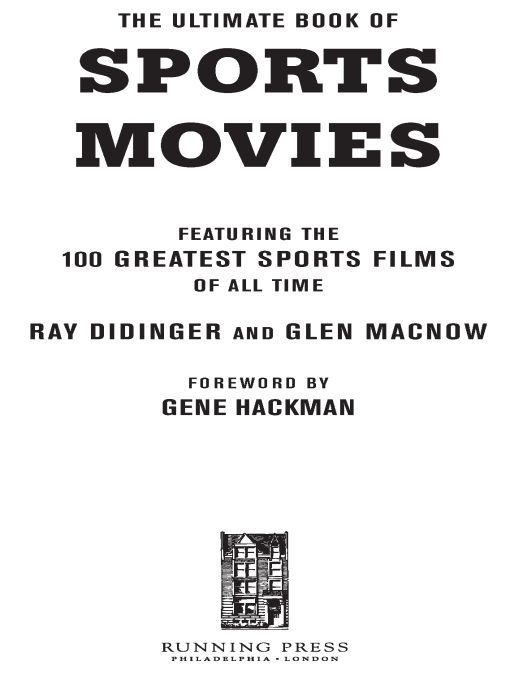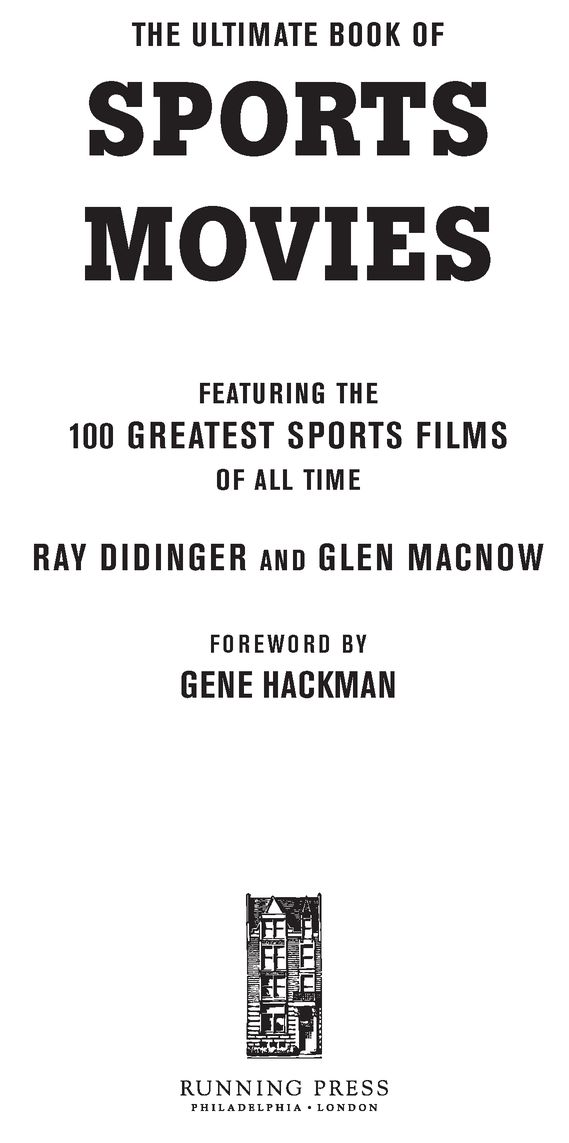Table of Contents
DEDICATIONS
To Maria: My editor, my soul mate and my inspiration. You make all things possible.
To Emily: Welcome to the family. We could always use another good sports fan.
ACKNOWLEDGEMENTS
There are many people we would like to thank for their help in putting this book together. Greg Jones, our editor at Running Press, endorsed the project from the start and helped guide it along the waydespite his repeated lobbying that we include The Big Lebowski. And Josh McDonnell did a great job with the design.
Thanks to Phil Martelli, coach of the St. Josephs University Hawks, for preparing a scouting report on the Hickory High Huskers.
Thanks to Frank Weimann, our agent at The Literary Group International, who helped find a market for a book about sports films.
Thanks to the many sports public relations directors who helped us gather quotes, including Zack Hill, Rich Burg, Mark Dalton, Rick Smith, Kevin Byrne, Pat Hanlon, Peter John-Baptiste, Rich Dalrymple, Jim Saccomano, Harvey Greene, Jack Brennan, Doug Miller, Dan Edwards and Craig Kelley. Also, Chip Namias, director of Athlete and Event Sports Public Relations, and Kathy Duva, who got us in touch with Buddy McGirt and Mark Breland. Thanks also to the athletes and others who provided the quotes.
Thanks to our interns, Brandon Kamin, Ben Seal and Chris DiFrancesco, who helped compile lists and contact sourcesand offered advice beyond their years. Also, thanks to our meticulous fact checker Paul Jolovitz. (If you find any mistakes, blame him.)
Thanks to NFL Films producers Chris Barlow, Steve Seidman and Angela Torma who asked various narrators and interview subjects to name their favorite sports movies. Also, thanks to producers Ken Rodgers, Greg Smith, Gerry Reimel, Garrett Fittizzi, Steve Lucatuorto and Adam Ryan who debated the merits of the top 100 films over many lunches in the NFL Films cafeteria. (Sorry, Garrett, but Over the Top still didnt make it.) Thanks to David Plaut for providing research material from his personal library.
Thanks to Versus producer Kate Evans for helping to enlist Gene Hackman for the foreword.
FOREWORD
BY GENE HACKMAN
Movies have the ability to make us believe. If only wed had that one little break, that indefinable moment of clarity where we saw that opening between tackle and guard and ran over the linebacker... then we could have scored, big time. If wed just had that clear shot at the basket then it would have put us into the finals. We coulda been contenders.
Maybe youll recognize this scene. On the Waterfront certainly wasnt a sports movie, but I love the metaphor. The camera focuses on two men arguing in the back seat of a taxi. The older brother had taken the odds to deliver his younger sibling to the bookmakers in the kids big fight at the Garden. The younger brother had gone along and taken the dive. Some of the dialog went like this:
Remember that night in the Garden, Charlie, Terry, the ex-boxer, tells his older brother. You came down to the locker room... It aint your night kid, you said, Were going for the price on Wilson. Remember that? Terry implores. I coulda taken Wilson apart. You shoulda looked out for me, Charlie. I coulda been somebody.
How many times have we heard shoulda, coulda? Most men, when asked if they played sports, will answer either with an equivocal Yeah, I coulda, but I had to work after school. Or better yet, I was really fast, I woulda scored, but they never threw me the ball.
In our memories at least, we seem to be just a smidgen away from that dream of glory Irwin Shaw described so well in his short story The 80-Yard Run. Way past his youth, Shaws hero goes back to the practice field where he had that one spectacular run. He relives the moment, going through all the moves, once again breaking clear into the end zone. If he coulda just had the opportunity to do as well in a real game, he laments.
It doesnt seem to matter that a lot of people go on to be successful doctors, lawyers, politicians, writers, salesmen. There is still that lingering moment we have fantasized about, over the course of so many years. We think, surely it must be at least partially true; that 80 yard run, that clear shot at the basket. Weve relived it so many times, how could it not be?
The movies solve so beautifully many of those fantasies for us. The quality of many lives, unfortunately, are predicated on how well they adjust to not having been selected to that all-important first team. The movies adjust that for us; we are able to lose ourselves in the pure joy of sport, and forget for the moment that destiny had other things in mind for us.
Film sets up the individual or the team with a conflictthe boxers lack of connections, the skiers stubborn independence, the baseball players field of dreams.
As viewers we sit watching, seeing clearly what our team or individual must do, praying that the actors show at least a modicum of athleticism, loving it. Yeah, that one little break, go man go... yesss, and for the next two hours we get to live with the heros manful quest to overcome his problems, learn something about himself, secure the admiration of girlfriends and town folk and watch him bathe in the camaraderie of his fellow competitors.
Maybe best of all we are able to empathize for just a few moments with fallen heroes like the ex-boxer as played by Marlon Brando in the back seat of that taxi with Rod Steiger.
So what happens? Brando says. Wilson gets a shot at the title in the ballpark. What did I get? A one-way ticket to Palookaville. You shoulda looked out for me, Charlie. I coulda had class. I coulda been a contender. I coulda been somebody.
Ahhh... the movies, we love them.
AUTHORS NOTE:
Chris Nashawaty of Entertainment Weekly calls Gene Hackman maybe the finest actor alive and, indeed, his credits include some of the most memorable film performances of the last half century.
He won the Academy Award for Best Actor in 1971 for his portrayal of detective Jimmy Popeye Doyle in The French Connection. He won his second Oscar as Best Supporting Actor for his chilling performance as Sheriff Little Bill Daggett in Unforgiven . That film also won Best Picture honors in 1992.
Hackman was nominated for Oscars on three other occasions for his work in Bonnie and Clyde (1967), I Never Sang for My Father (1970) and Mississippi Burning (1988). Yet to many movie-goers he is best remembered as Coach Norman Dale in Hoosiers, the sublime 1986 film about Indiana high school basketball.
Many have said they cant imagine anyone other than Gene Hackman playing Norman Dale, wrote film critic James Berardinelli. His performance is letter-perfect, from the competitive heat he shows during games to the reflective sadness that emerges in quieter moments. The film doesnt have to give us a detailed backstory for Norman: Hackmans acting provides us with a full definition of his personality.
Sports are a familiar backdrop for Hackmans acting talents. In addition to Hoosiers, he portrayed an Olympic skiing coach driving Robert Redford to glory in Downhill Racer (1969), a former football star turned private detective in



